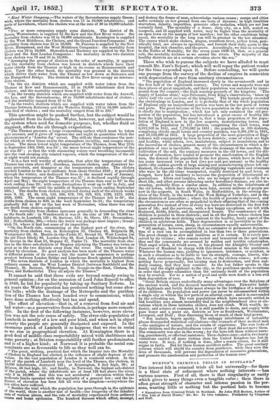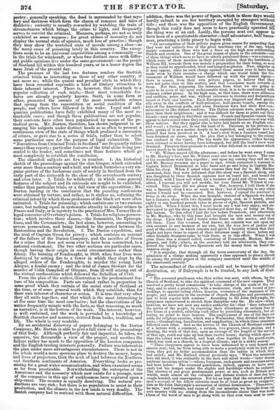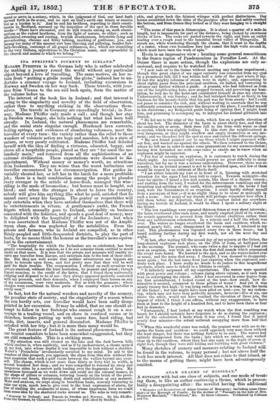BURTON'S CRIMINAL TRIALS IN SCOTLAND. * Tire interest felt in criminal
trials all but universally-for there is a blasé state of refinement where nothing interests-has various sources. First of all, there is that singularity or rarity which gives to many things even a tangible value ; then there is often great strength of character and intense passion in the per- sons, wanting little or nothing but the poetical halo to become • Narratives from Criminal Trials in Scotland. By John Hill Burton, Author of " The Life of David Hume," &c. &c. In two volumes. Published by Chapman and Hall. "I poetay; generally speaking, the deed is surrounded by that mys- tery and darkness which form the charm of romance and tales of diablerie ; curiosity is usually rewarded by watching the train of circumstances which brings the crime to light, and frequently serves to convict the criminal. Manners, perhaps, are not so truly exhibited as some suppose; for great crimes of necessity do not display the normal state of opinion, much less of practice ; though they may show the wretched state of morals among a class—as the many cases of poisoning lately in this country. The. excep- tions seem to be an universal superstition among a community—as —as in the trials for witchcraft, or when two distinct races with differ ent public opinions live under the same government—as the people of 800tland till within this hundred years, or in a lesser degree the mere Irish of the present day.
The presence of the last two features renders the Scottish criminal trials as interesting as those of any other country, if not more so; while the quaint and peculiar style in which they have been recorded snperadds a kind of literary attraction to their inherent interest. There is, however, this drawback to a ular collection of such trials,—their most remarkable fea-
es are already popularly known. Scott, in some form or other, presented the essence of the most remarkable crimes that sprang from the superstition or social condition of the people, and others have followed in his wake. Legal and anti- quarian publications have fully exhibited many of the most re- markable cases; and though these publications are not popular, their contents have often been popularized by means of the pe- riodical press. Mr. Burton, therefore, has shown judgment in ar- ranging his subjects under distinct heads so as often to present a continuous view of the state of things which produced a succession of crimes, or gave rise to a series of trials, rather than to select some particular case for the purpose of legal exhaustion. The "Narratives from Criminal Trials in Scotland " are frequently rather essays than reports ; particular features of the trial alone being pre- sented to the reader, and sometimes not those features which go most completely, to establish the conclusion. The classified subjects are five in number. 1. An historical sketch of the prow-dings against the elan Gregor, which extended over more than a century ands half, and which furnishes a very sin- gular picture of the barbarous state of society in Scotland from the early part of the sixteenth to the close of the seventeenth century and even later. 2. Trials for witchcraft; in which some general features of the subject and its rationale are sought to be exhibited, rather than particular trials, or a full view of the superstition ; Mr. Burton landing in the conclusion that the puzzling confessions were obtained by torture, and rather, as it strikes us, softening the erimin el intent by which these professors of the black art were often animated. 3. Trials for poisoning ; which contain one or two curious eases, but nothing equal in systematic atrocity to similar crimes in France and Italy, or in mystery to the practicesof Mrs. Tamer the al- leged coneocter of Overbury's poison. 4. Trials for religions persecu- tion; which involve three classes,—the Romanists, the Episcopa- lians, and the Covenanters; the last alone, howeVer, amounting to severe persecution, and being limited to the period between the Restoration and the Revolution. 5. The Darien expedition, and the trial of Captain Green for piracy ; which contains an account of the failure of the Darien Company, and the sacrifice of Green for a crime that does not seem ever to have been committed, to a national excitement. The two other sections are particular cases, though having their origin in social circumstances rather than felony. The burning of Fendraught, in 1630, when four lives were destroyed by setting fire to a tower in which they slept by the alleged orders of the Fendraughts, to murder the young Lord Aboyne, a feudal enemy; and the trial of James Stewart for the murder of Colin Campbell of Gienare, from ill-will arising out of the virtual confiscations which followed the Rebellion of 1745.
From the plan of the author, illustration is the predominant fea- ture of his composition. Facts are valued rather in proportion to some proof which they contain of the social state of Scotland at the time, or of some general truth which they establish, than for their own interest of character or action. It is true that very often they all unite together, and that which is the most interesting is at the same time the most conclusive ; but the observations of the writer frequently mingle with the facts, so that reasoning, as much as narrative, is at the bottom of the work. The interest, however, is well sustained, and the work is pervaded by a knowledge of Scottish character and manners, derived from books, tradition, and life. The whole is very readable.
By an accidental discovery of papers belonging to the Darien Company, Mr. Burton is able to give a full view of the proceedings of that body. Although perfectly fair and impartial, he takes, we conceive, too favourable a view of the project, and ascribes the failure rather too much to the opposition of the London companies and the English trading interests generally. Failure was inherent in the plan under more advantageous circumstances. There is not in the whole world a more specious place to destroy the money, hopes, and lives of projectors, than the neck of land between the Northern and Southern continents of America. Everything looks so pro- mising for a great water-communication, and when examined seems se far from practicable. Notwithstanding the enterprise of the Americans and the necessity which now exists for a passage, none ofthe companies in this age of recklessness have ventured upon a ship-canal. The country is equally deceiving. The natural pro- ductions are very rich ; but there is no population to assist in their production, and the climate in the low lands is very deadly. The Seotoh company had to contend with these natural difficulties. In
addition, there was the power of Spain, which in those days would hardly submit to see her territory occupied by strangers without title ; and there was the opposition of the English Government, though this really does not seem to have practically operated till the thing was at an end. Lastly, the persons sent out appear to have been of a questionable character—half adventurer, half bucca- neer, practising a little piracy to begin with. "An investigation of their private papers gives reason for suspecting that they were not entirely free of the great maritime vice of the age, which simply consisted in those who had a force on the high seas confounding Mends and enemies. One of the great causes of alarm to the colonists—one of those things which seem to have so utterly paralyzed them—was a rumour, which some of them mention in their private letters, that the harshness oi William III. towards them was merely a preparation for their being, so soon as they could be apprehended, tried and hanged as pirates. Now, singular as it may appear, since no such charge against them seems ever to have been made even by their enemies—a charge which one would think the Go- vernment of William would have followed up with the utmost rigour— there is reason, from their own private papers, to believe that they were not quite clear on this matter, and that conscience made cowards of them. Not that, supposing the inference from what we are going to quote to be even of the most unfavourable kind, it is to be confounded with ordinary robber piracy. In the high seas, at that time, there were alliances and conflicts, peace and war, without reference to treaties and declarations issued at Paris and London. Each European war lingered and died gradu- ally away in the conflicts of half-privateer, half-pirate vessels, among the keys of the American gulfs, and some European wars had their first com- mencement in like distant conflicts. The Darien colonists were, perhaps, no nicer than their neighbours ; • and it was difficult for them to point out their friends—easy enough to find their enemies. French and Spanish vessels they appear to have seized when they could ; they considered themselves at war with these nations. But they appear also to have laid hands on an English colo- nial vessel ; a daring act, to say the least of it. Paterson, in his private re- port, speaks of it as a matter deeply to be regretted, and explains how he himself had been involved in it. A boat's crew from a Jamaica vessel had been detained on shore, under the plea that a boy belonging to the colony was confined in the vessel. The boy made his appearance, either having been released or never having been kidnapped, but still the boat's crew were detained. Paterson then proceeds to relate what followed in a manner which leaves much to be inferred.
" 4 Mr. Wilmot stayed till the afternoon ; and before he went away I came to Mr. Mackay's hut, and Mr. Wilmot came also to take his leave. The rest of the councillors were then together; and upon my coming they oall me in, and Mr. Mackay presents me a paper to sign, which contained a warrant to Captain Robert Drummond to take boats and go and bring in Captain Ma- thias his sloop. When I asked what reasons they had for it, Mr. Mackay answered, that they were informed that this sloop was a Spanish sloop, and was fraughted by three Spanish captains now on board her, and bound for Portubell, with I know not what, for a treasure of gold and silver bars; and added, I warrant you will not meddle, for your friend Mr. Wilmot is con- cerned. This usage did not please me. But, however, I told them if she was a Spanish sloop I was as ready as they ; but if belonging to any other nation I would not be concerned. But, however, .1 signed the warrant to bring in the sloop. When she was brought, instead of a Spanish we found her a Jamaica sloop with two Spanish passengers, and, as I heard, about eighty or one hundred pounds value in pieces of eight, Spanish instals, and gold dust. When I found this, I must needs say I was very angry, and en- deavoured to get the sloop and men discharged next day, as being an Eng- lish bottom. To this effect I laid the law before Pennicook, and afterwards to Mr. Mackay, who by this time had brought the men and money out of the sloop. Upon this I said I would write home on this matter, and then left them. Upon this occasion, God knows, my concern was not upon my own account or any humour of my own, but the true love of justice and good of the colony ; in which concern and spirit I heartily wished that they might not have cause to repent of their inhuman usage of those before any other friendly strangers came to visit them, or to this effect. When I was gone there was a council called, consisting of Pennicook, Mackay, Mont- gomery, and Jolly ; where, as the secretary told me afterwards, they con- firmed the taking of the two Spaniards and the money from on board the Jamaica sloop.'
" It is singular, that through all the fierce controversy of the day, the admission of a charge making apparently a close approach to piracy should lie among the private papers of the company unnoticed until the middle of the nineteenth century."
The misconduct of the colonists could not be traced to spiritual destitution, or, if Dalrymple is to be trusted, to any lack of disci- pline.
" The reverend gentleman who thus writes was sent, with others, by the Church of Scotland, to take the spiritual command of the new empire. They received a pretty broad commission to take charge of the souls of the co- lony, and to erect a presbytery, with a moderator, clerk, and record of pro- ceedings, to appoint ruling elders, deacons, overseers of the manners of the people, and assistants in the exercise of church discipline and government, and to hold regular kirk sessions.' According to Sir John Dalrymple, the clergymen endeavoured to stretch their discipline very far. lie says—what, however, we have not seen any earlier authority for—that they exhausted spirits of the people, by requiring their attendance at sermon four or five hours at a stretch, relieving each other by preaching alternately, but al- lowing no relief to their hearers. The employment of one of the days set aside for religious exercise, which was a Wednesday, they divided into three parts,—thanksgiving, humiliation, and supplication; in which three ministers followed each other. And as the service of the Church of Scotland consists of a lecture with a comment, a sermon, two prayers, three psalms, and a blessing, the work of that day, upon an average of the length of the service of that age, could not take up less than twelve hours; during which space of time the colony was collected, and kept close together in the guard-room, which was used as a church, in a tropical climate, and in a sickly season.' " These clergymen appear to have been influenced by a very honest and sincere zeal; but, far from being able to make a presbytery with its kirk ser- vices, they got no better accommodation than the cabins in which they had sailed ; and Mr. Borland almost poetically says, When the ministers here did meet, it was ordinarily in the dark and silent woods—' inter densas umbrosa cacumina sylvas '—where, I suppose, such guests and exercises never had been before.' fhe reverend gentleman, indeed, appears to have seri- ously lost his temper under the slights and hardships which he endured. The absence of any great predominant power at sea, such as Britain now wields, made almost all the colonists and distant traders of that day lax, rough-handed, and unscrupulous. Yet let us hope that the reverend gentle- man's account of his fellow colonists must be at least as great an exaggera- tion as Sir John Dalrymple's accusation of clerical domination. Thesource,' he says, and fountain, and cause of all our miseries, we brought from our own country with us; arising from the inconsiderate choice that was made there of the worst of men to go along with us that ever were sent to cool- wand or serve, in a eolony, which, in the judgment of God, our land Math spewed forth as its scum, and no spot en God's earth can retain or receive but as a burden to it' And he and his brethren, reporting to their cousti- taenta in Scotland, summed up the iniquities of the spot in these forcible words= There have abounded, and do still remain among us, such abomi- nations as the rudest heathens, from the l*ht of nature, do abhor ; such as atheistical swearing and cursing, brutish drunkenness, detestable lying and prevaricating, obscene and filthy talking, mocking of godliness; yea, and among too many of the meaner sort base thieving and pilfering, besides Sab- bath-breaking, contempt of all gospel ordinances, &c., which are stumbling to the very Indians, opprobrious to the Christian name, and reproachful to the church and natant to which we belong.' "




























 Previous page
Previous page